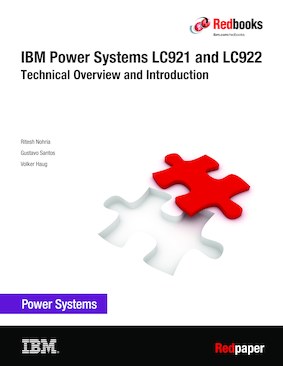Abstract
This IBM® Redpaper™ publication is a comprehensive guide that covers the IBM Power Systems™ LC921 and LC922 (9006-12P and 9006-22P)) servers that use the current IBM POWER9™ processor-based technology and supports Linux operating systems (OSes). The objective of this paper is to introduce the offerings and their capacities and available features.
These new Linux scale-out systems provide differentiated performance, scalability, and low acquisition cost, and include the following features:
- Superior throughput and performance for high-value Linux workloads.
- Low acquisition cost through system optimization (industry-standard memory and industry-standard three-year warranty).
- Rich I/O options in the system unit. There are 12 large form factor (LFF)/small form factor (SFF) bays for 12 SAS/SATA hard disk drives (HDDs) or solid-state drives (SSDs), and four bays that are available for Non-Volatile Memory Express (NVMe) Gen3 adapters.
- Includes Trusted Platform Module (TPM) 2.0 Nuvoton NPCT650ABAWX through I2C (for secure boot and trusted boot).
- Integrated MicroSemi PM8069 SAS/SATA 16-port Internal Storage Controller Peripheral Component Interconnect Express (PCIe) 3.0 x8 with RAID 0, 1, 5, and 10 support (no write cache).
- Integrated Intel XL710 Quad Port 10 GBase-T PCIe 3.0 x8 UIO built-in local area network (LAN) (one shared management port).
- Dedicated 1 Gb Intelligent Platform Management Interface (IPMI) port.
This publication is for professionals who want to acquire a better understanding of IBM Power Systems products. The intended audience includes:
- Clients
- Sales and marketing professionals
- Technical support professionals
- IBM Business Partners
- Independent software vendors (ISVs)
Table of Contents
Chapter 1. Architectural and technical description
Chapter 2. Management and virtualization
Chapter 3. Reliability, availability, and serviceability
Appendix A. Server racks and energy management
